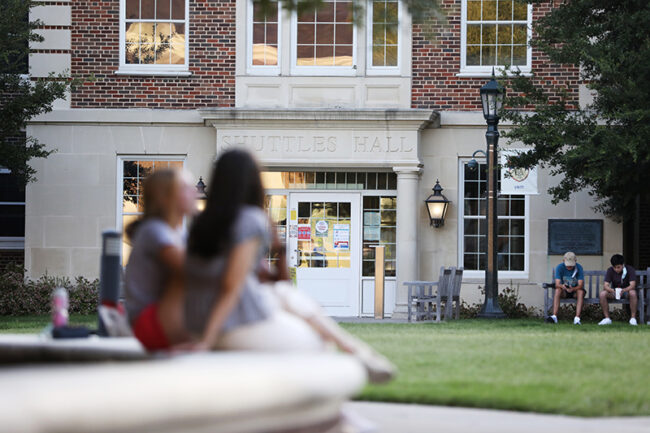By: Adam Czarnik, Ana Paula Llenas, and Taylor Hipp
With the onset of our new “virtual normal”, students, faculty, and staff at SMU must adapt to new ways of living while minimizing the spread and transmission of the novel coronavirus. These new habits include things like social distancing, mask wearing, and reduced travel. In particular, the new habit of reduced travel has made the university take the stance on completely removing our spring break to remove the uncontrollable rise of cases that could ensue.
While it may be indisputable that a week-long spring break inherently encourages students to leave campus and is an explicit endorsement of student travel, that does not negate the fact that spring break provides a necessary respite from the stresses of school. Emma K. Adam, professor of education and social policy at Northwestern University in Illinois and a contributor to the APA (American Psychological Association) report states that, “Without those breaks of relief, heightened chronic stress can become unhealthy and lead to serious long-term health and social consequences.”
Faculty and students alike have reported negative effects of not having breaks this semester. SMU Junior Lauren Horton shares her experience this past semester:
“I am majoring in computer science and minoring in physics while taking the normal course load of an average student (15 credit hours). I am also the president of Crum Commons. Without breaks this last semester I have burned out so easily. I have lost motivation to do schoolwork, I was nearly reduced to tears by the seemingly endless amounts of work, and I am stressed out by the lack of grades I am receiving. I am so tired and so done and yet I don’t get any breaks or any respite from work or presidential duties.”
From the teaching perspective, faculty have also been reporting their negative experiences. Around late October, a survey asking faculty about their mental health this semester due to the lack of breaks was sent out. Almost 48% of the respondents said that the structure of this semester has adversely affected their mental wellbeing.
Included in the same survey were questions about how faculty perceive students are handling the break-less semester—almost 60% responded that their students’ wellness was unfavorably affected. While some faculty (about 28%) reported that they did not believe there was a negative impact, we feel that not all faculty are completely engaged in their students’ lives. One anonymous survey response stated that, “If you love what you do and you love your students [,] you find it within yourself to give it your best but it is definitely harder this year and more exhausting.”
We co-authored student senate bill S-107-09 to address these concerns. The legislation explicitly calls upon SMU administration to work 5 wellness days into the spring academic calendar to support students. We purposely did not ask for specific dates to give administration the freedom to choose dates that will not cause an uncontrollable increase in COVID cases nor overburden capacity limits. We also urge the departments to collaboratively determine days that benefit students across all disciplinaries of study.
To their credit, Provost Loboa and Vice President Mmeje responded with a letter recognizing, “The need to develop strategies to reduce the potential stressors brought on by a spring semester. However, [SMU] must balance these valid concerns with the need to promote campus health and safety during the pandemic.”
Nonetheless, the spring academic calendar includes Good Friday as a day off for all members of the campus community; we regret that administration stopped there.
Many of our peer institutions including Rice, TCU, Tulane, and all the Ivy League schools are implementing wellness days in the upcoming spring 2021 semester. We hope that SMU will follow the lead of all these schools we consistently compare ourselves to by committing to 5 wellness days for our students, faculty, and staff.
Adam Czarnik is a junior Computer Science major with an Economics minor from Saratoga, California. He has the privilege of serving as a Student Senator representing Lyle Engineering, a resident assistant in Kathy Crow Commons, a member of the Honors Program Student Advisory Board, and a member of the Computer Science Student Advisory Board. His views do not necessarily reflect those of the organizations he is affiliated with and are solely his own perspective.
Ana Paula Lleras is a junior from Houston, Texas majoring in accounting and economics with finance applications with a minor in statistics. She is a Hegi Career leader who serves on the Hegi Student Advisory Board, a member of Women in Business, and has the privilege of serving as Student Senator representing the Cox School of Business. Her views do not necessarily reflect those of the organizations she is affiliated with and are solely her own perspective.
Taylor Hipp is a sophomore from Lubbock, TX. She is studying applied physiology and sports management and corporate communications and public affairs. She currently serves as a Pre-Major Senator, and is a junior Panhellenic delegate for Alpha Chi Omega. Her views also do not necessarily reflect those of the organizations she is affiliated with and are solely her own perspective.
The Daily Campus welcomes opinion contributions from students, faculty and community members. Submissions should be no more than 1000 words and are subject to copy editing. Please email submissions to smudailycampus@gmail.com, and include a cell phone number and a short biography. All pieces submitted to and published by The Daily Campus are under the publishing and editorial purview of the paper once published.















